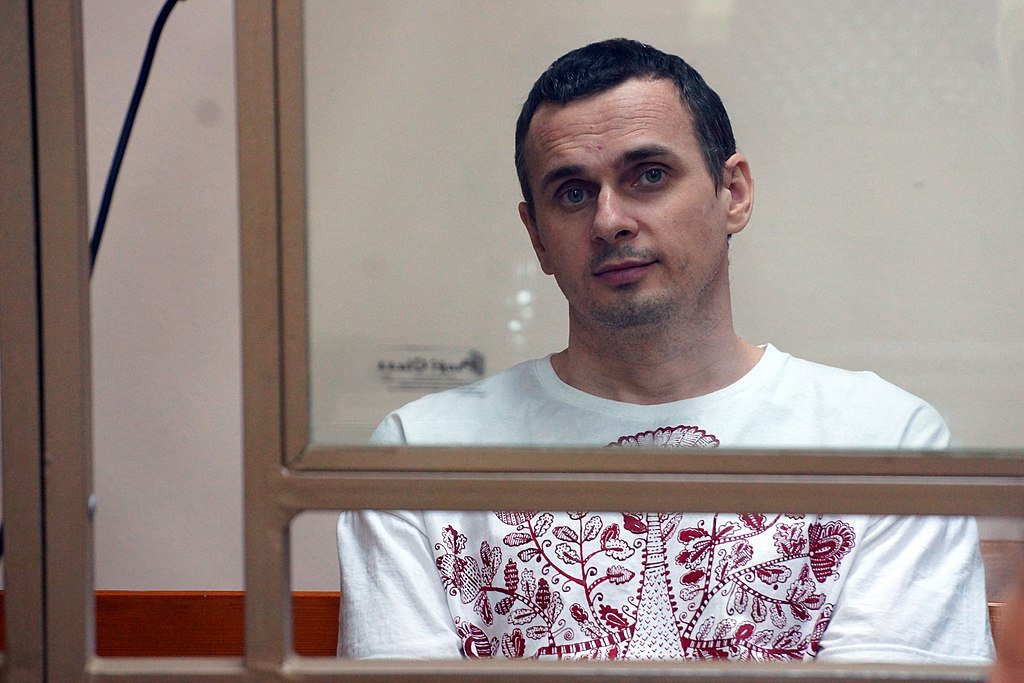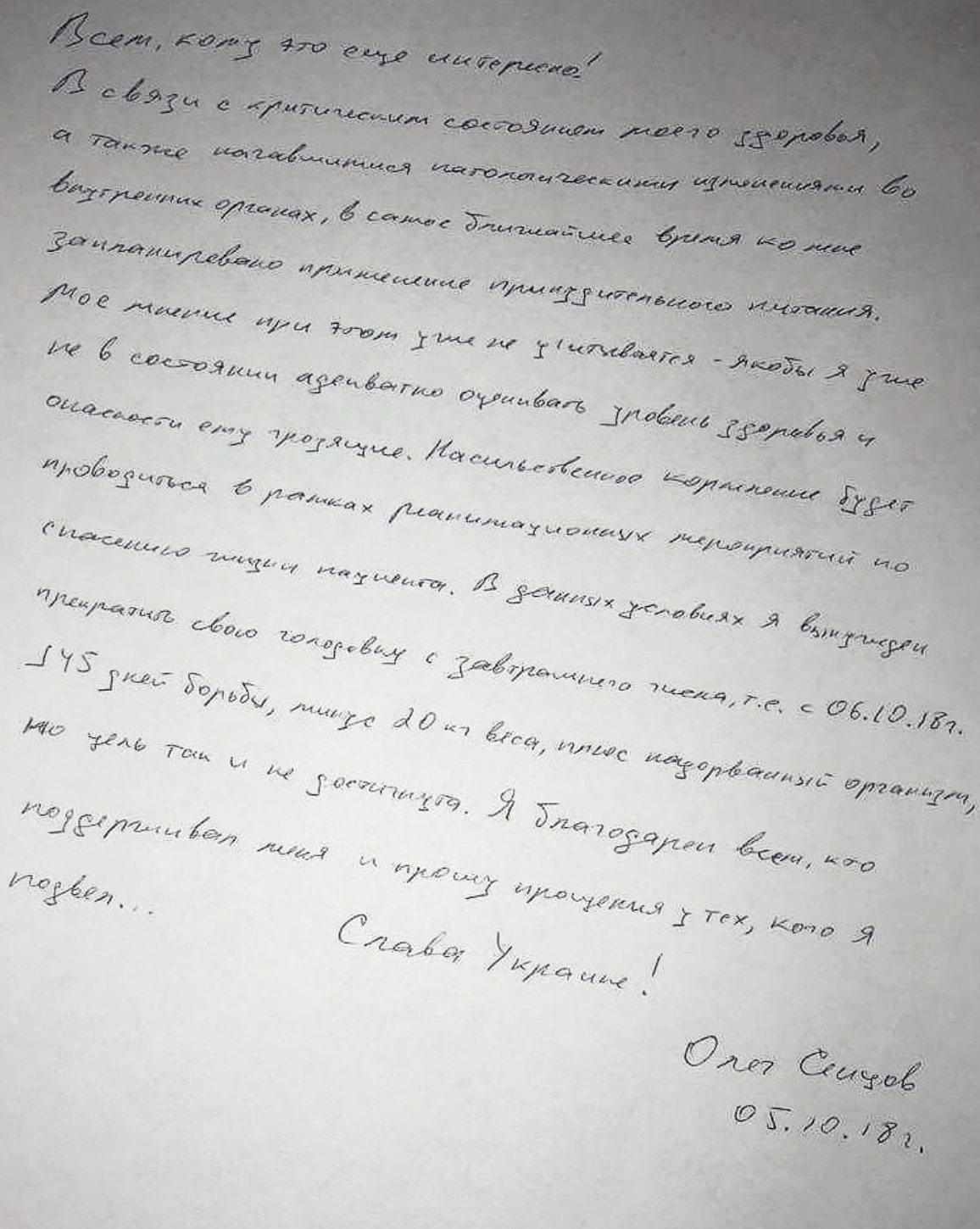Imprisoned Ukrainian writer and filmmaker Oleg Sentsov says he will end hunger strike
Photo: CC BY-SA 4.0
Today marks day 145 of Sentsov's hunger strike, which he began on 14 May to urge the Russian authorities to release all Ukrainian nationals currently imprisoned in Russia on politically motivated grounds.
A letter written by Sentsov, first posted here, explains he has been forced to end the hunger strike as his health is in 'critical condition.' The letter follows below in English and Russian:
To all those who are still interested!
Due to the critical condition of my health, as well as pathological changes in my internal organs that have begun to take place, in the very near future I am scheduled to be force fed. My opinion is not taken into account – allegedly I am no longer able to adequately assess the condition of my health and the dangers threatening it. Force-feeding will be carried out as part of resuscitation measures to save the patient's life. In these conditions, I have to stop my hunger strike from tomorrow, i.e. from 06.10.18. 145 days of struggle, minus 20 kg of weight, plus an irreparably damaged body, but the goal has still not been achieved. I am grateful to everyone who supported me and I apologise to those whom I have failed ....
Glory to Ukraine!
Oleg Sentsov 5/10/18
Всем, кому это еще интересно!
В связи с критическим состоянием моего здоровья, а также начавшимися патологическими изменениями во внутренних органах, в самое ближайшее время ко мне запланировано применение принудительного питания. Мое мнение при этом не учитывается – якобы я уже не в состоянии адекватно оценивать уровень здоровья и опасности ему грозящие. Насильственное кормление будет проводиться в рамках реанимационных мероприятий по спасению жизни пациента. В данных условиях я вынужден прекратить свою голодовку с завтрашнего числа, т.е. с 06.10.18 г. 145 дней борьбы, минус 20 кг веса, плюс надорванный организм, но цель так и не достигнута. Я благодарен всем, кто поддерживал меня и прошу прощения у тех, кого я подвел...
Слава Украине!
Олег Сенцов
05.10.18 г.
PEN International continues to call on the Russian authorities to release Sentsov immediately. Should there be grounds for prosecution on charges of terrorism, these should be heard by a civilian court under Ukrainian law. The organisation further calls on the Russian authorities to respect Oleg Sentsov’s human rights, including the prohibition of torture and inhuman or degrading treatment, and his right to medical attention.
Background
Best known for his 2011 film Gamer, Ukrainian filmmaker and writer Oleg Sentsov has been on hunger strike since 14 May 2018. In a statement shared by his lawyer, Oleg Sentsov declares an ‘indefinite hunger strike’ and that ‘the sole condition for its cessation is the release of all Ukrainian political prisoners located in the territory of the Russian Federation’. According to media reports, he told his lawyer that he is prepared to die should his demand be ignored.
Oleg Sentsov took part in the EuroMaidan demonstrations that toppled former Ukrainian President Viktor Yanukovych in February 2014. He helped deliver food to Ukrainian soldiers following Russia’s occupation and illegal ‘annexation’ of Crimea in February-March 2014. He said he was arrested by the Russian security services at his apartment in Crimea on 10 May 2014. He reported being subjected to a brutal three-hour ordeal involving beatings, suffocation and threats of sexual assault. To PEN International’s knowledge, his allegations have yet to be investigated by the Russian authorities.
His arrest was officially recorded on 11 May 2014 on the grounds of ‘suspicion of plotting terrorist acts’ and membership of a terrorist group (the Ukrainian right-wing group Pravyi Sektor, Right Sector). He was taken to Russia on 23 May 2014 where he spent over a year in pre-trial detention. He was eventually charged with the establishment of a terrorist group, politically-motivated arson and conspiring to blow up a statue of Lenin, all of which he denied.
Following a trial widely condemned outside of Russia, in which a key prosecution witness retracted his statement, saying it had been extracted under torture, Oleg Sentsov was found guilty and sentenced to 20 years in prison by the military court of Rostov-on-Don on 20 August 2015. His sentence was upheld on appeal on 24 November 2015. In October 2016, the Russian authorities denied a request for extradition to Ukraine on the grounds that he had become a Russian citizen following Russia’s occupation and ‘annexation’ of Crimea. He is currently being held in the prison colony of Labytnangi in Siberia.
PEN International denounces serious flaws in judicial proceedings against Oleg Sentsov, including his lengthy pre-trial detention, the failure to investigate his allegations of torture as well as the fact that he was tried by a Russian military court and is now being held in Russia. Under international law, Crimea constitutes occupied territory and as the occupying power, Russia is obliged not to transfer civilian prisoners out of the territory. Trying civilians in military courts also violates international human rights norms.
In April 2015, the United Nations Human Rights Committee expressed concerns at ‘allegations that Oleg Sentsov has been deprived against his will of his Ukrainian nationality, tried in Moscow as a citizen of the Russian Federation and subject to legal proceedings that fail to meet the requirements of Articles 9 and 14 of the International Covenant on Civil and Political Rights’. It called on the Russian authorities to investigate all allegations of serious human rights violations and to ensure that appropriate and transparent procedures are in place for Crimean residents to revisit their decision concerning their nationality.
Oleg Sentsov is the winner of the 2017 PEN/Barbey Freedom to Write Award.
Freedom of expression in Crimea
Following the Russian occupation and illegal ‘annexation’ of Crimea in March 2014, the Russian authorities and the de facto Crimean authorities have pursued a crackdown on independent media, opposition politicians and activists. Fourty-three people expressing dissent have been forcibly disappeared since the ‘annexation’; six have since been found dead, the whereabouts of 17 remains unknown. None of these disappearances have been effectively investigated and nobody has been held accountable. Ukrainians criticising Russia have also been subject to restrictive Russian legislation.
PEN International continues to call for a peaceful resolution to the conflict in Ukraine.
For further details contact Aurélia Dondo at PEN International, Koops Mill, 162-164 Abbey Street, London, SE1 2AN, UK Tel: +44 (0) 20 7405 0338 Fax +44 (0) 20 7405 0339 e-mail: [email protected]


